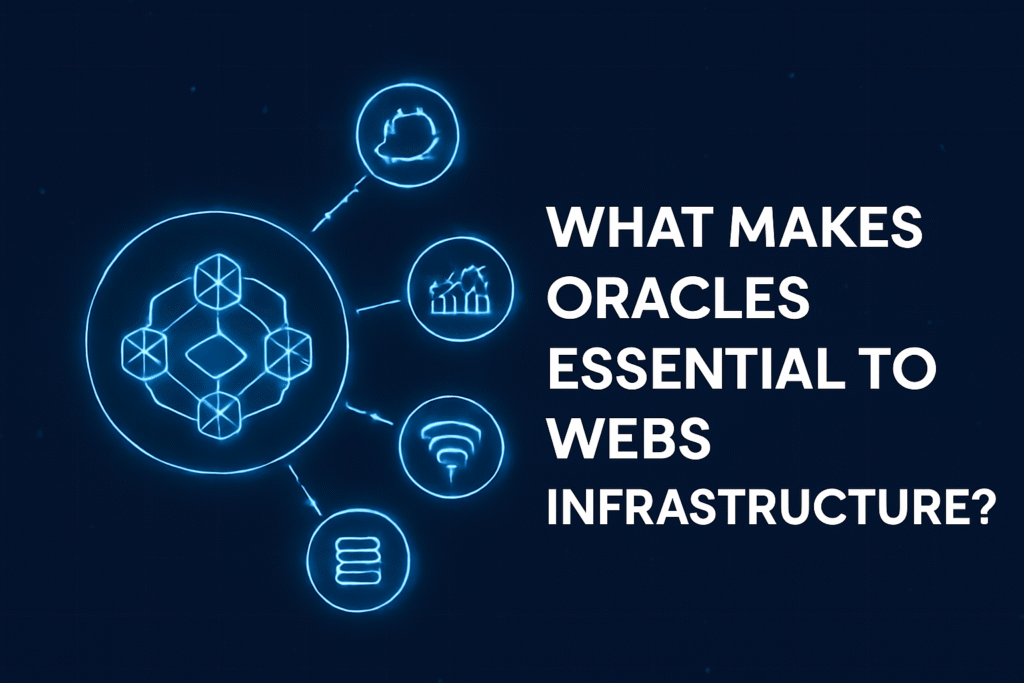Web3 represents the next evolution of the internet, a decentralized ecosystem where users, applications, and services can interact without relying on centralized intermediaries. One of the key components enabling this shift is the use of oracles. Oracles serve as the bridge between the decentralized world of blockchains and the centralized world of external data. They are vital in providing smart contracts with the real-world information needed to execute complex decentralized applications (dApps). This article will explore the importance of oracles in Web3 infrastructure and how they enhance the functionality of blockchain technology.
Understanding Oracles in the Context of Blockchain
At their core, oracles are services that fetch and verify external data, bringing it onto the blockchain for use by smart contracts. Smart contracts are self-executing contracts with the terms of the agreement directly written into code. However, for smart contracts to function beyond the blockchain environment, they require access to external data, such as market prices, weather conditions, or sports results. This is where oracles come into play.
Blockchains themselves are secure and immutable, but they cannot access or verify data outside of their network. Oracles solve this problem by serving as a reliable link to external information. For example, if a decentralized finance (DeFi) application needs real-time cryptocurrency price feeds to facilitate trading, oracles will deliver this information to the blockchain, enabling the smart contract to execute transactions based on accurate data.
Types of Oracles and Their Role in Web3
There are different types of oracles, each serving specific needs within the Web3 ecosystem:
- Software Oracles: These oracles fetch data from online sources such as APIs or websites. They are commonly used for retrieving data like stock prices or weather updates.
- Hardware Oracles: These oracles connect physical devices to blockchains. They are used to verify data from IoT (Internet of Things) devices, like temperature sensors or GPS devices, making them crucial for supply chain management and other real-world tracking systems.
- Inbound Oracles: These bring external data into the blockchain. Inbound oracles provide the blockchain with information about events, prices, or conditions that occur off-chain.
- Outbound Oracles: These oracles send data from the blockchain to the outside world. They can trigger actions in the real world based on events happening within the blockchain. For example, they could trigger a payment to a service provider after a condition on the blockchain is met.
- Consensus-based Oracles: These oracles aggregate data from multiple sources and use decentralized consensus mechanisms to ensure the accuracy and reliability of the information provided. This type is increasingly important in decentralized networks, as it eliminates single points of failure.
Related article: Stablecoins and the State: Can the U.S. Really Dominate Crypto Innovation?
Why Oracles Are Crucial for Web3 Infrastructure
Oracles are indispensable for the following reasons:
- Enabling Smart Contracts to Interact with the Real World
Without oracles, smart contracts would be restricted to operating solely within the blockchain. They could only execute transactions based on data that resides on the blockchain, limiting their functionality. By fetching and verifying real-world data, oracles enable smart contracts to execute complex conditions that involve external events or information. - Promoting Decentralization
Web3 is built on the promise of decentralization, where no central authority controls data or transactions. Oracles help maintain this decentralization by offering decentralized data feeds. For example, decentralized oracles like Chainlink aggregate data from multiple sources, ensuring that the blockchain can rely on accurate and tamper-resistant information from multiple independent parties. This reduces the risk of single points of failure or manipulation. - Enhancing Trust and Transparency
The role of oracles in ensuring transparency cannot be overstated. They make sure that data transmitted to the blockchain is both reliable and verifiable. With decentralized oracles, users can trust that the data feeding into a blockchain is not manipulated by any central authority, thus increasing the trustworthiness of decentralized applications. - Supporting Complex Applications
Web3 applications, particularly those in DeFi, gaming, and NFTs, require access to vast amounts of data from the outside world. Oracles facilitate these applications by providing real-time updates, allowing for actions like trade executions, automated insurance claims, or even NFTs linked to real-world assets. Oracles help power applications that require external data to function smoothly and efficiently. - Enabling Cross-Chain Interoperability
Oracles are also essential for achieving interoperability between different blockchains. Since blockchains are isolated networks, oracles can connect them by providing cross-chain data. For instance, an oracle could facilitate a decentralized exchange (DEX) where tokens from different blockchains can be swapped. This opens up more opportunities for developers and users within the Web3 ecosystem.
Real-World Examples of Oracles in Action
Several projects have already integrated oracles into their systems, showcasing their importance in Web3. Chainlink, one of the leading decentralized oracle networks, provides price feeds for major DeFi platforms such as Aave and Synthetix. Another notable example is the use of oracles in supply chain management, where IoT data can trigger smart contracts to automatically release payments when goods are delivered.
In the gaming industry, oracles enable live updates of in-game assets, ensuring that rare items or in-game currencies are tied to real-world market prices, thereby enhancing the user experience and adding a layer of value.
Conclusion
Oracles play an irreplaceable role in bridging the gap between the blockchain and the outside world. They enable smart contracts to access real-time, verifiable data, allowing decentralized applications to execute based on external events or conditions. As the Web3 ecosystem continues to evolve, oracles will remain a cornerstone of decentralized innovation, driving the widespread adoption of blockchain technology across various industries. Without oracles, Web3 would not be able to achieve the level of functionality and trust that is expected from this new decentralized future.





